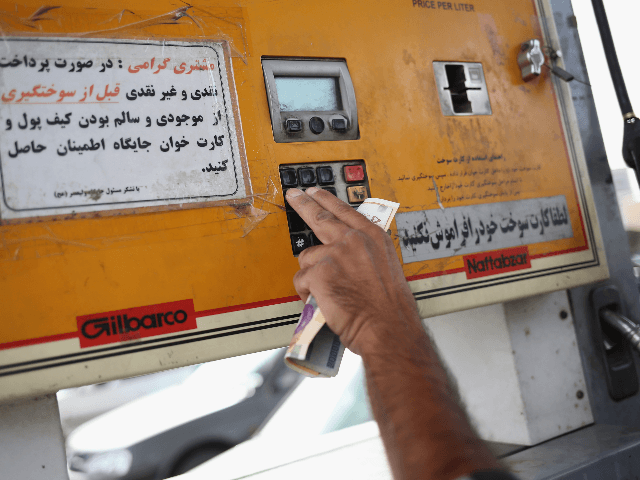The appearance of the Wuhan coronavirus in Iran is causing a great deal of anxiety in the region and producing some immediate negative effects as trade across Iran’s borders shuts down.
The Kurdistan Region experienced a bout of petrol panic on Monday as rumors of an impending fuel shortage spread, even though the authorities said there has been no significant supply disruption to date.
Kurdish news service Rudaw reported the panic spread like wildfire as word of Iranian border closings spread, despite assurances by the Kurdistan Regional Government (KRG) that an “adequate amount of fuel” has been stockpiled, the Kurdistan Region produces much of its own fuel in any event, and gas stations are not turning any customers away:
Hawraz Yasin, a motorist queuing at a petrol station in eastern Erbil’s Bnaslawa district, told Rudaw English on Monday evening he was warned the border closure would cause a spike in fuel prices.
“I received a phone call from my cousin telling me I must rush to a petrol station as soon as possible because Iran’s border is closed and I have to refuel before the price goes up,” Yasin said.
“People say corona is coming, so it is better to be prepared.”
Abdulkhaliq Yaziden, who was also queuing, accused corrupt officials of trying to profit from the panic by hiking prices.
“We are now twice panicked – once by the fuel crisis and another by the corona. What should we do? Believe me, everyone is confused,” he added.
One attendant working at the Kirkuk Station in Bnaslawa said there was plenty of fuel to go around and couldn’t understand what had sparked the panic.
“It is very strange. I just don’t know why all these people have come out this late at night and everyone is fighting over fuel. We have enough petrol and there is no shortage,” the station attendant told Rudaw English.
The KRG actually exports refined oil products to Iran, a matter of some dismay to U.S. officials because the oil trade violates sanctions against the regime in Tehran.
A spokesman for the KRG speculated the gas panic was caused by announcements that traffic across the Iranian border would be adjusted to reduce the risk of the coronavirus spreading. Police departments were instructed to investigate reports of profiteering, a problem that has also affected medical supplies as fear of the coronavirus spreads across Kurdish cities.
The KRG Ministry of Health stated on Monday that despite rumors to the contrary on social media, no confirmed cases of the coronavirus have been detected in the Kurdistan region.
Reports of the virus in Iraq prompted some panic buying of protective supplies and gasoline, as well as exacerbating tensions between the KRG and the central government in Baghdad, which was already gripped by a long-running political crisis.
Afghanistan, Iraq, Bahrain, Kuwait, and Oman all reported their first confirmed coronavirus cases this week, while the growing outbreak in Iran is making its neighbors extremely nervous. Shiite Muslims from other countries frequently travel to Iran, theological and political headquarters of Shia Islam, and many of Iran’s coronavirus cases are clustered around “holy cities” like Qom. The Iranian health ministry recognized this problem last week and asked Shiite religious leaders to begin limiting the number of pilgrims who can visit religious sites in Qom.
The secretive Iranian government is widely suspected of concealing information about the spread of the virus. The New York Times noted on Monday that many Iranians do not believe what their government is saying about the outbreak, and the people of other countries are even less trusting:
Now the slow drip of news about the spread of the virus is compounding Tehran’s already acute credibility problems, less than two months after officials were forced to admit lying about their knowledge of the accidental downing of a Ukrainian passenger jet by air defense systems. Many Iranians on Monday were openly skeptical about the official accounts of the spread of the virus.
A member of Parliament representing Qom claimed on Monday that at least 50 people had already died there, including 34 in quarantine, and that the first case had been reported more than two weeks before officials acknowledged any infections.
“Every day 10 people are dying in Qom,” the lawmaker, Ahmad Amiri Farahani, asserted in a speech to Parliament, demanding a quarantine on his city.
Health ministry officials vehemently disputed his claims. “I will resign if the numbers are even half or a quarter of this,” said Ahmad Harirchi, adviser to the health minister.
Another blow was struck against public confidence in Iran when the doctor in charge of Qom’s response to the coronavirus, Dr. Mohamad Reza Ghadir, was himself sent to quarantine. On his way to isolation, he said officials in Qom have been ordered not to “publish any statistics” about the outbreak, which he described as “very dire” and “spread across the city.”
The KRG has responded with alarm to the virus news from both Iraq and Iran. On Tuesday the KRG began limiting travel to the rest of Iraq and temporarily shutting down schools after four coronavirus cases were reported in Kirkuk. The four people believed to be infected in Kirkuk are members of the same family who recently returned from a trip to Iran.
The KRG imposed travel restrictions to Iran in late January and strengthened them last week, closing all border traffic on Thursday and requiring all Iraqis returning from Iran to undergo tests for the virus.

COMMENTS
Please let us know if you're having issues with commenting.